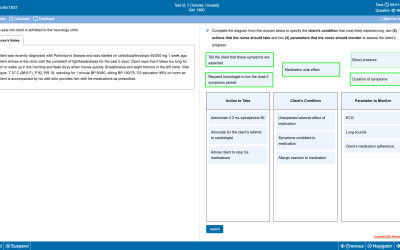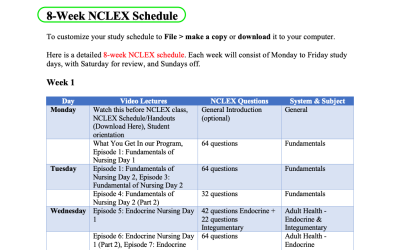Understanding Computer Adaptive Testing for the NCLEX: How It Determines Your Pass or Fail
Curious about how the NCLEX uses computer adaptive testing (CAT) to assess your performance? This guide explains how CAT works and determines whether you pass or fail the exam. Ready to understand the NCLEX better? Dive in below!
What is Computer Adaptive Testing (CAT)?
Computer Adaptive Testing (CAT) is a method used by the NCLEX to tailor the exam to your ability level in real-time. Unlike traditional exams, where every candidate receives the same set of questions, CAT adjusts the difficulty of questions based on your previous answers. This ensures a more accurate and individualized assessment of your nursing competence.
How Does CAT Work?
Here’s a step-by-step breakdown of how CAT functions during the NCLEX:
- Initial Question: The exam starts with a question of medium difficulty.
- Adaptive Questioning: Based on your response, the computer selects the next question:
- If you answer correctly, the next question will be slightly more difficult.
- If you answer incorrectly, the next question will be slightly easier.
- Continuous Adjustment: This process continues throughout the exam, with the computer continuously adjusting the difficulty of questions to match your ability level.
- Test Length: The number of questions can vary:
- The minimum number of questions is 75 (15 of which are pretest questions and do not count towards your score).
- The maximum number of questions is 145.
- The exam will continue until it can be determined with 95% confidence that your ability is clearly above or below the passing standard.
How Does CAT Determine When You Pass or Fail?
CAT determines your pass or fail status based on the following criteria:
- 95% Confidence Interval Rule: The test ends when the computer is 95% confident that your ability is above or below the passing standard.
- Maximum-Length Exam Rule: If you reach the maximum number of questions (145), the computer analyzes your performance. If your ability estimate is above the passing standard, you pass; if it’s below, you fail.
- Run-Out-Of-Time Rule: If you run out of time before reaching the maximum number of questions, the computer considers the last 60 questions you answered. If you’ve consistently performed above the passing standard, you pass.
Tips for Success with CAT
Understanding CAT can help you develop effective strategies for taking the NCLEX:
- Stay Calm and Focused: Each question impacts your next one, so stay calm and concentrate on each question individually.
- Don’t Overthink the Difficulty: Because CAT adjusts to your ability level, you might feel the questions are getting harder, but this means you’re performing well.
- Pace Yourself: Keep an eye on the time but don’t rush. Ensure you have enough time to consider each question carefully.
- Practice with Adaptive Tests: Use NCLEX practice tests that simulate CAT to get comfortable with the format and question styles.
- Strengthen Weak Areas: Use your Candidate Performance Report (CPR) from previous attempts to focus on improving weaker areas.
Why Understanding CAT Matters
Knowing how CAT works can demystify the NCLEX and reduce anxiety. It also allows you to tailor your study and test-taking strategies to maximize your performance. Remember, each question is an opportunity to demonstrate your competence, and CAT is designed to accurately reflect your abilities.
Ready to Crush the NCLEX?
For personalized study plans, expert guidance, and extensive practice questions that mimic the CAT format, enroll in our course at crushnclex.com. We’re here to help you navigate the NCLEX and achieve success!
FAQs
Q: What is the minimum and maximum number of questions on the NCLEX? A: The minimum number of questions is 75, and the maximum is 145. The exact number depends on when the computer determines your pass or fail status.
Q: How does CAT ensure a fair assessment? A: CAT adjusts the difficulty of questions based on your answers, providing a customized and accurate measure of your ability level.
Q: What happens if I run out of time on the NCLEX? A: If you run out of time, the computer will consider the last 60 questions you answered to determine if your performance was consistently above the passing standard.
Conclusion
Understanding the mechanics of computer adaptive testing can boost your confidence and enhance your test-taking strategy. With the right preparation and mindset, you can conquer the NCLEX and embark on a successful nursing career. Good luck, and happy studying!



